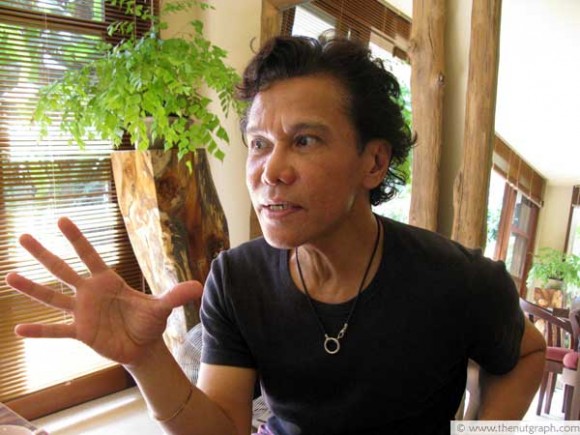
Ramli Ibrahim (all pics below courtesy of Ramli Ibrahim)
LEGENDARY Malaysian dancer Ramli Ibrahim, 58, has been captivating
audiences with his performances and choreography of Indian classical
dance for almost three decades. After returning from Australia, Ramli
founded
Sutra Dance Theatre in 1983. He has gone on to perform and win awards both locally and overseas, and has also groomed many a talented dancer.
In this 11 March 2010 interview with
The Nut Graph in
Petaling Jaya, Ramli talks about his staunch yet fluid Malay-ness, and
his desire for a Malaysia that can be comfortable with its own
diversity. A fuller version of this interview was published exclusively
in Volume 1 of
Found in Malaysia.
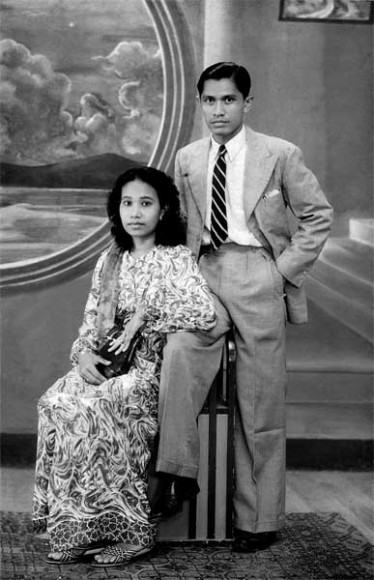
Ramli's parents
TNG: Where and when were you born?
Ramli Ibrahim: I was born in Kajang, on 20 May 1953, and brought up in Kuala Lumpur.
Where in Kuala Lumpur did you grow up?
I grew up in Jalan Pekeliling, which is now Jalan Tun Razak. I went
to the Pasar Road Malay School and then to the infamous Cochrane Road
School, where all the gangsters were, then to the
Royal Military College (RMC), and then to Australia.
I didn’t do my “O” levels but did my matriculation. I was the
earliest of the Mara (Bumiputera Council Trust) batch of matriculation
students who were sent to Perth.
I did my degree in engineering, knowing very well that my eventual destiny would be in the arts as a dancer or in theatre.
Just to digress: I have always been interested in the healing aspect of
mak yong. I started delving into mak yong when its public performance was banned in the early 1990. I have looked at mak yong through
main ‘teri (from “main petri”).
I am interested in the use of myth to heal the psyche. I am
fascinated by the two polarities of personality-types of dewa muda and
dewa pechil (dewa terpencil), the extroverted and the introverted in
traditional Malay character archetypes found in mak yong and used in
healing.
Main ‘teri is a compelling example of how traditional psychotherapy
functions through the performance of the tok ‘teri (shaman) who
manipulates the metaphors found in these myths to enable him to heal
through the release of blocked angin and strengthening of the semangat.
The approach found in traditional healing of “unusual sickness” or
sicknesses of the mind, is fascinating for me.
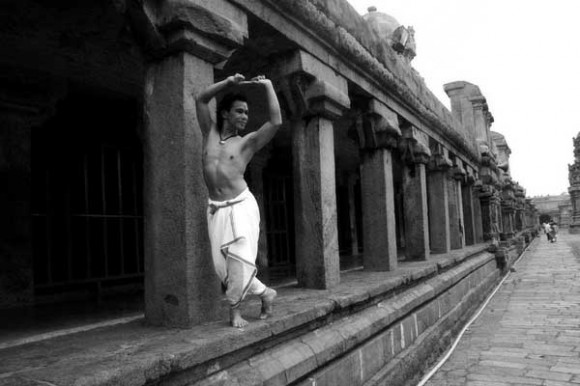
Among a thousand pillars in Tanjavur, India (pic by Karthik Venkataraman)
But on this subject of culture and tradition, can you trace your ancestry?
I was told that my father was from Rawa, Sumatera. My mother was more
or less from the Malacca area, or Kelemak. Is there such a thing as
“pure Malay”? I don’t know; my mother and grandmother looked a bit
Chinese. My father is dark; he could look like a mamak. That has never
been a problem for me. Anyway, I’m not into tracing my family tree
(yet).
But I think we are as Malay as you can get.

A chubby Ramli, the heart-breaker at two and half years old (1955).
So growing up in Jalan Pekeliling, what is your strongest memory?
As a child I read Hikayat Malim Deman, and [all the others] in Jawi!
My father was a Malay literature lecturer. So we were surrounded by
Syair Siti Zubaidah, Sejarah Melayu and the old Malay books. I recited
those syairs, and I was even johan syair kebangsaan (national syair
champion) in Kuala Lumpur when I was 11. It was only after my remove
class that I started to speak English.
There must be a link somewhere between all of this and doing classical Indian dance.
It’s a progression. My mother and father were religious and staunch Umno supporters. My mother was in the
Kaum Ibu.
I was brought up on that wave of perjuangan. So I am familiar with
stalwarts like (Tan Sri) Aishah Ghani. But this is a bygone era — the
perjuangan thing is over. It probably died with Tun
Ghafar (Baba).
I find the present globalised era devoid of the true perjuangan ethos,
and there is cynicism when altruism is mentioned, especially in
politics.
Are there are any stories from your parents or grandparents that stick in your mind?
My mother always talked to me about the
Haw Par Villa
(in Singapore): the concept of good and evil, and in neraka how you’re
going to be paralysed and potong lidah (have your tongue cut off) and
all those things. She terrified me with images of the hereafter.
One of the things she told me as a child that I thought was cruel was
that I was a Chinese anak angkat (adopted child) from a Chinese
vegetable seller. I found that this is the kind of story every parent
tells all the time. They don’t know that this has an incredible effect
on their own child.
[…]
But my mother’s stories were character forming. My father was quiet.
His influence, not to say that he [did not have] much effect on me, was
not the same.
I think eventually the balancing of my anima and animus was important
because I am now very comfortable with my anima. It balances my
androgyneity, which is important for Indian dance. I tell my students,
“If you are a good performer, you have to balance the ‘male’ and the
‘female’ within you.” You have to be almost neutral [so as to] inhabit
the character and feel the “rasa”. And especially in Indian classical
dance where you have to take on many roles, you have to be quicksilver
when making this transformation.
One of the saddest things about the present Malay situation is not
being able to understand the energy transforming from one manifestation
to another. You cannot pinpoint and say, “This is the only way you can
do it.” But the Malays through the introduction to a more patriarchal
and Semitic religion, have become literal-minded rather than [exercise]
their ability to use metaphors — which they used to be able to do. Now
they want only the concrete thing, whereas the real thing is not so easy
to grasp.
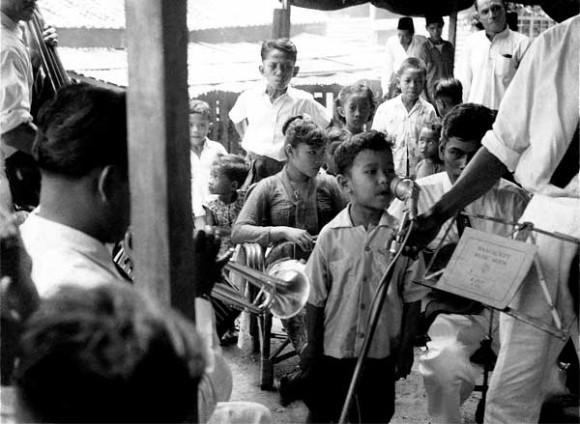
A five-year-old Ramli already showing off as a singer at a wedding function, Kerling (1958)
As a Malaysian is there anything you struggle with about yourself or your identity?
Whatever happens, I’m psychically connected with this place. I was in
Australia for 14 years but was less psychically connected with
Australia. I can’t remember much of my time there; except for some
performances, nature, or surfing. Whereas in Malaysia or in this region,
with India and Indonesia, I have an intense psychic connection.
This where I am. I have been fighting my battle in Malaysia. Come
what may, this is where I’m going to be. I see it as a process. Nothing
is going to be completely good, but I must have the equanimity to accept
it, and be with it and do whatever I can.
But there’s this current debate about what it means to be
Malay, “Jangan cabar Melayu,” “Jangan cabar Islam,” — what do you think
of all this?
Look, I do Indian classical dance because I find it’s one of the most
challenging and difficult art forms for solo [dance]. In that sense
I’ve always been a global person, because I am into all the best that
[the world] can offer. At the same time, I’m very nationalistic. I don’t
like it when I see mak yong, main petri and
wayang kulit being banned. I think they’re the best of Malay traditional pastimes that we have.
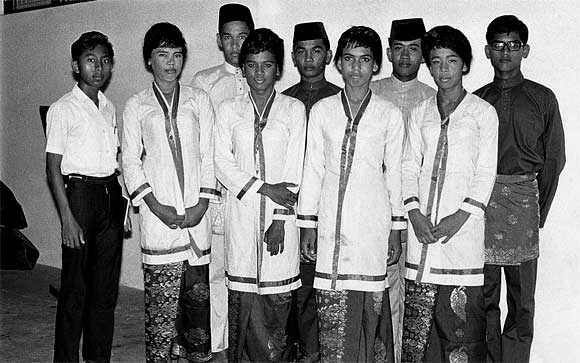
Ramli (in songkok), a “freshie” at RMC, roped in to do the Malay joget. Back row (left), 1969
As an advocate of Malay culture, do you think now that some
people who claim to champion Malay culture have things back to front?
The people who [truly] champion Malay culture now are not necessarily
Malay. We go back to being Malaysians. And Malay culture is part of
Malaysian culture. So now there are
non-Malays
championing makyong or wayang kulit. They also champion Chinese opera
and Indian classical dance. They see it as, “The richer we are in
culture, the better.”
What about the politicians who say, you cannot challenge this or that, this is what it means to be Malay.
I think the Malays have got their own insecurities. Having said that,
life is not easy. That’s why the mak yong has a tendency to identify
with the dewa pechil, or dewa terpencil. Dewa pechil is a Malay
archetype. He is complex as he is very sensitive. But when he leaves,
the nation is bereft of “seri”. He is the kind of person who always
merendahkan diri, (appears) to want to be in the background. This is one
aspect of the Melayu that I find endearing, and at the same time
exasperating. Not pushy, very accommodating, affectionate and loving.
And I think the Malays have always been in between the
entrepreneurial races, with the Chinese on one side and so on. It’s
difficult now to make a shift to being tough, because it is against the
grain. But it can be done. It is a complex problem: how do we balance
this?
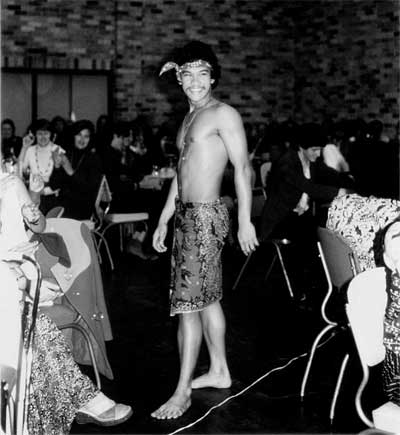
Ramli, the trendsetter, modelling the sarong during a university student function
But [spoon-feeding Malay Malaysians] is not going to help either,
because the entire political scene is suspect. And the more you are
spoon-fed, the weaker you get. So this has got to be a balancing act,
and we need visionary leaders whom we can trust and who can change a lot
of atrophied mindsets.
It’s hard to find a solution — the problem lies in the nation’s
psychic make-up which is not homogenous and cannot be measured
quantitatively in profit and loss. It’s one of the complex human dramas
which can be alluded to in an artistic manifestation, in literature,
film or theatre. That’s why art is so important as a moderator and as an
agent of understanding that brings about change of the nation’s psyche.
So then what kind of Malaysia do you want to see?
I want to see Malaysians only. The generations of non-Malays are
fully Malaysians, [as are] Malays also. Malays now are changing,
especially the urban ones. But we don’t know what the non-urban ones are
thinking because there has been insecurity there. The ketuanan Melayu
thing, the religious upbringing, the madrasah, the indoctrination
through Friday khutbah, is happening on different and subversive levels.
And this is indoctrination from young. It’s not a homogeneous society.
I think Malaysia has to resolve her issues about Malaysian-ness. How
this process [will] be brought forward is going to be difficult, because
Malays will feel like they are losing something, whereas they are
already losing a lot.
For example, when it comes to religion, I think one of the worst
things is what fundamentalist Islamism has done to women [and] to men.
We don’t want this kind of fanatical and rigid Islam. What do you think?
What I’m saying is true, isn’t it? That kind of Islam is a regression —
it’s the worst that could befall us.















